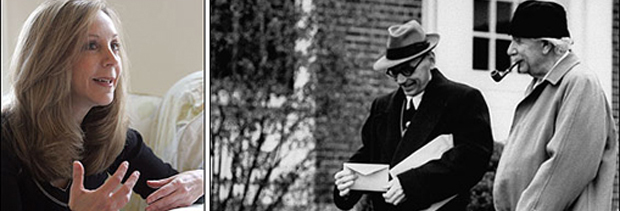 |
|
| "The remarkable theorem of incompleteness uncovered an unbridgeable gap in all attempts to systematize mathematical reasoning, a result that appears almost paradoxical." |
INCOMPLETENESS: The Proof and Paradox of Kurt Godel Thursday, May 17th, 2007 |
| Dr. Rebecca Goldstein Harvard University Rebecca Newberger Goldstein grew up in White Plains, New York, and graduated summa cum laude from Barnard College, receiving the Montague Prize for Excellence in Philosophy, and immediately went on to graduate work at Princeton University, receiving her Ph.D. in philosophy. While in graduate school she was awarded a National Science Foundation Fellowship and a Whiting Foundation Fellowship. After the success of her initial novel The Mind-Body Problem other novels followed: The Late-Summer Passion of a Woman of Mind, The Dark Sister, which received the Whiting Writer’s Award, Mazel, which received the 1995 National Jewish Book Award and the 1995 Edward Lewis Wallant Award, and Properties of Light: A Novel of Love, Betrayal, and Quantum Physics. Her book of short stories, Strange Attractors, received a National Jewish Book Honor Award. Her 2005 book Incompleteness: The Proof and Paradox of Kurt Gödel, was featured in articles in The New Yorker and The New York Times, received numerous favorable reviews, and was named one of the best books of the year by Discover magazine, the Chicago Tribune, and the New York Sun. Goldstein’s most recent book is, Betraying Spinoza: The Renegade Jew who Gave Us Modernity, published in May 2006. In 1996 Goldstein became a MacArthur Fellow, receiving the prize which is popularly known as the “Genius Award.” In 2005 she was elected to The American Academy of Arts and Sciences. In 2006 she received a Guggenheim Fellowship and a Radcliffe Fellowship. Professor Goldstein has taught in the Columbia MFA writing program and in the department of philosophy at Rutgers, has been a visiting scholar at Brandeis University, and taught for five years as a Visiting Professor in the Department of Philosophy at Trinity College in Hartford, Connecticut. Recently she was a Fellow at the Radcliffe Institute for Advanced Study at Harvard University. She lives in Boston and Truro. |
Kurt Gödel is considered the greatest logician since Aristotle. His monumental theorem of incompleteness demonstrated that in every formal system of arithmetic there are true statements that nevertheless cannot be proved. The result was an upheaval that spread far beyond mathematics, challenging conceptions of the nature of the mind.
Rebecca Goldstein, a MacArthur-winning novelist and philosopher, explains the philosophical vision that inspired Gödel's mathematics, and reveals the ironic twist that led to radical misinterpretations of his theorems by the trendier intellectual fashions of the day, from positivism to postmodernism. Ironically, both he and his close friend Einstein felt themselves intellectual exiles, even as their work was cited as among the most important in twentieth-century thought. For Gödel , the sense of isolation would have tragic consequences. This lucid and accessible study makes Gödel's theorem and its mindbending implications comprehensible to the general audience, while bringing this eccentric, tortured genius and his world to life. |